BUS1204 Equity Market Report: Analysis of US Stock Market Fall
VerifiedAdded on 2023/06/15
|6
|1321
|270
Report
AI Summary
This report analyzes the US stock market's worst fall in six years, as reported by the Financial Times, and relates it to equity market and stock valuation concepts. The article discusses the Dow Jones Industrial Average's significant drop and the subsequent impact on global markets. The report explores the potential causes of the sell-off, including rising interest rates, inflation concerns, and unwinding of positions. It also touches upon the role of volatility indexes and exchange-traded products. Furthermore, the analysis incorporates insights from financial experts and considers the broader economic context, including central bank policies and US Treasury prices. The report concludes by emphasizing the importance of understanding market fundamentals and maintaining a skeptical perspective amidst market volatility. This document is available on Desklib, a platform offering a wealth of study resources, including past papers and solved assignments, for students.
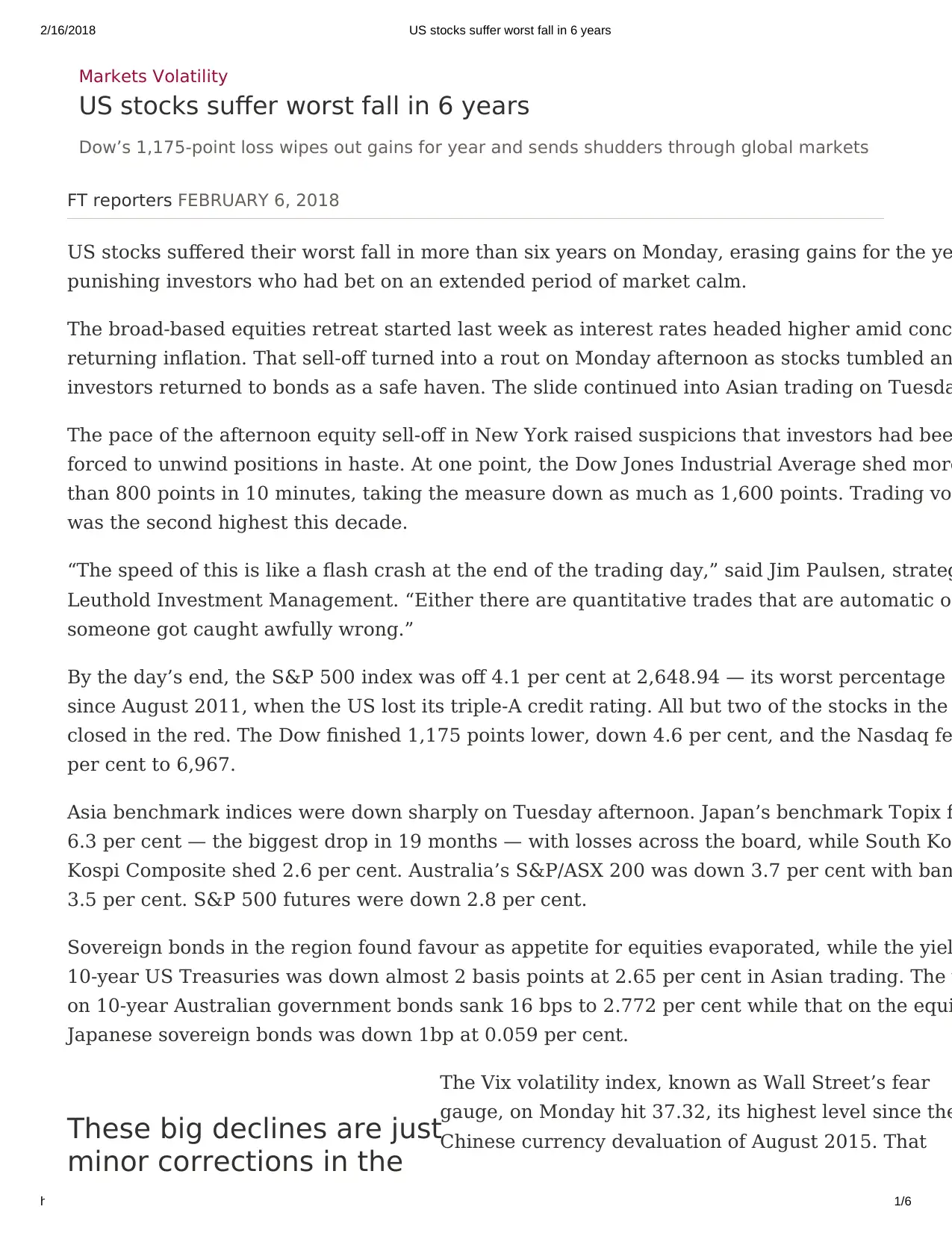
2/16/2018 US stocks suffer worst fall in 6 years
https://www.ft.com/content/af1f8e4a-0a23-11e8-8eb7-42f857ea9f09 1/6
FT reporters FEBRUARY 6, 2018
US stocks suffered their worst fall in more than six years on Monday, erasing gains for the ye
punishing investors who had bet on an extended period of market calm.
The broad-based equities retreat started last week as interest rates headed higher amid conc
returning inflation. That sell-off turned into a rout on Monday afternoon as stocks tumbled an
investors returned to bonds as a safe haven. The slide continued into Asian trading on Tuesda
The pace of the afternoon equity sell-off in New York raised suspicions that investors had bee
forced to unwind positions in haste. At one point, the Dow Jones Industrial Average shed more
than 800 points in 10 minutes, taking the measure down as much as 1,600 points. Trading vol
was the second highest this decade.
“The speed of this is like a flash crash at the end of the trading day,” said Jim Paulsen, strateg
Leuthold Investment Management. “Either there are quantitative trades that are automatic or
someone got caught awfully wrong.”
By the day’s end, the S&P 500 index was off 4.1 per cent at 2,648.94 — its worst percentage f
since August 2011, when the US lost its triple-A credit rating. All but two of the stocks in the
closed in the red. The Dow finished 1,175 points lower, down 4.6 per cent, and the Nasdaq fe
per cent to 6,967.
Asia benchmark indices were down sharply on Tuesday afternoon. Japan’s benchmark Topix f
6.3 per cent — the biggest drop in 19 months — with losses across the board, while South Kor
Kospi Composite shed 2.6 per cent. Australia’s S&P/ASX 200 was down 3.7 per cent with ban
3.5 per cent. S&P 500 futures were down 2.8 per cent.
Sovereign bonds in the region found favour as appetite for equities evaporated, while the yiel
10-year US Treasuries was down almost 2 basis points at 2.65 per cent in Asian trading. The y
on 10-year Australian government bonds sank 16 bps to 2.772 per cent while that on the equi
Japanese sovereign bonds was down 1bp at 0.059 per cent.
The Vix volatility index, known as Wall Street’s fear
gauge, on Monday hit 37.32, its highest level since the
Chinese currency devaluation of August 2015. That
These big declines are just
minor corrections in the
Markets Volatility
US stocks suffer worst fall in 6 years
Dow’s 1,175-point loss wipes out gains for year and sends shudders through global markets
https://www.ft.com/content/af1f8e4a-0a23-11e8-8eb7-42f857ea9f09 1/6
FT reporters FEBRUARY 6, 2018
US stocks suffered their worst fall in more than six years on Monday, erasing gains for the ye
punishing investors who had bet on an extended period of market calm.
The broad-based equities retreat started last week as interest rates headed higher amid conc
returning inflation. That sell-off turned into a rout on Monday afternoon as stocks tumbled an
investors returned to bonds as a safe haven. The slide continued into Asian trading on Tuesda
The pace of the afternoon equity sell-off in New York raised suspicions that investors had bee
forced to unwind positions in haste. At one point, the Dow Jones Industrial Average shed more
than 800 points in 10 minutes, taking the measure down as much as 1,600 points. Trading vol
was the second highest this decade.
“The speed of this is like a flash crash at the end of the trading day,” said Jim Paulsen, strateg
Leuthold Investment Management. “Either there are quantitative trades that are automatic or
someone got caught awfully wrong.”
By the day’s end, the S&P 500 index was off 4.1 per cent at 2,648.94 — its worst percentage f
since August 2011, when the US lost its triple-A credit rating. All but two of the stocks in the
closed in the red. The Dow finished 1,175 points lower, down 4.6 per cent, and the Nasdaq fe
per cent to 6,967.
Asia benchmark indices were down sharply on Tuesday afternoon. Japan’s benchmark Topix f
6.3 per cent — the biggest drop in 19 months — with losses across the board, while South Kor
Kospi Composite shed 2.6 per cent. Australia’s S&P/ASX 200 was down 3.7 per cent with ban
3.5 per cent. S&P 500 futures were down 2.8 per cent.
Sovereign bonds in the region found favour as appetite for equities evaporated, while the yiel
10-year US Treasuries was down almost 2 basis points at 2.65 per cent in Asian trading. The y
on 10-year Australian government bonds sank 16 bps to 2.772 per cent while that on the equi
Japanese sovereign bonds was down 1bp at 0.059 per cent.
The Vix volatility index, known as Wall Street’s fear
gauge, on Monday hit 37.32, its highest level since the
Chinese currency devaluation of August 2015. That
These big declines are just
minor corrections in the
Markets Volatility
US stocks suffer worst fall in 6 years
Dow’s 1,175-point loss wipes out gains for year and sends shudders through global markets
Paraphrase This Document
Need a fresh take? Get an instant paraphrase of this document with our AI Paraphraser
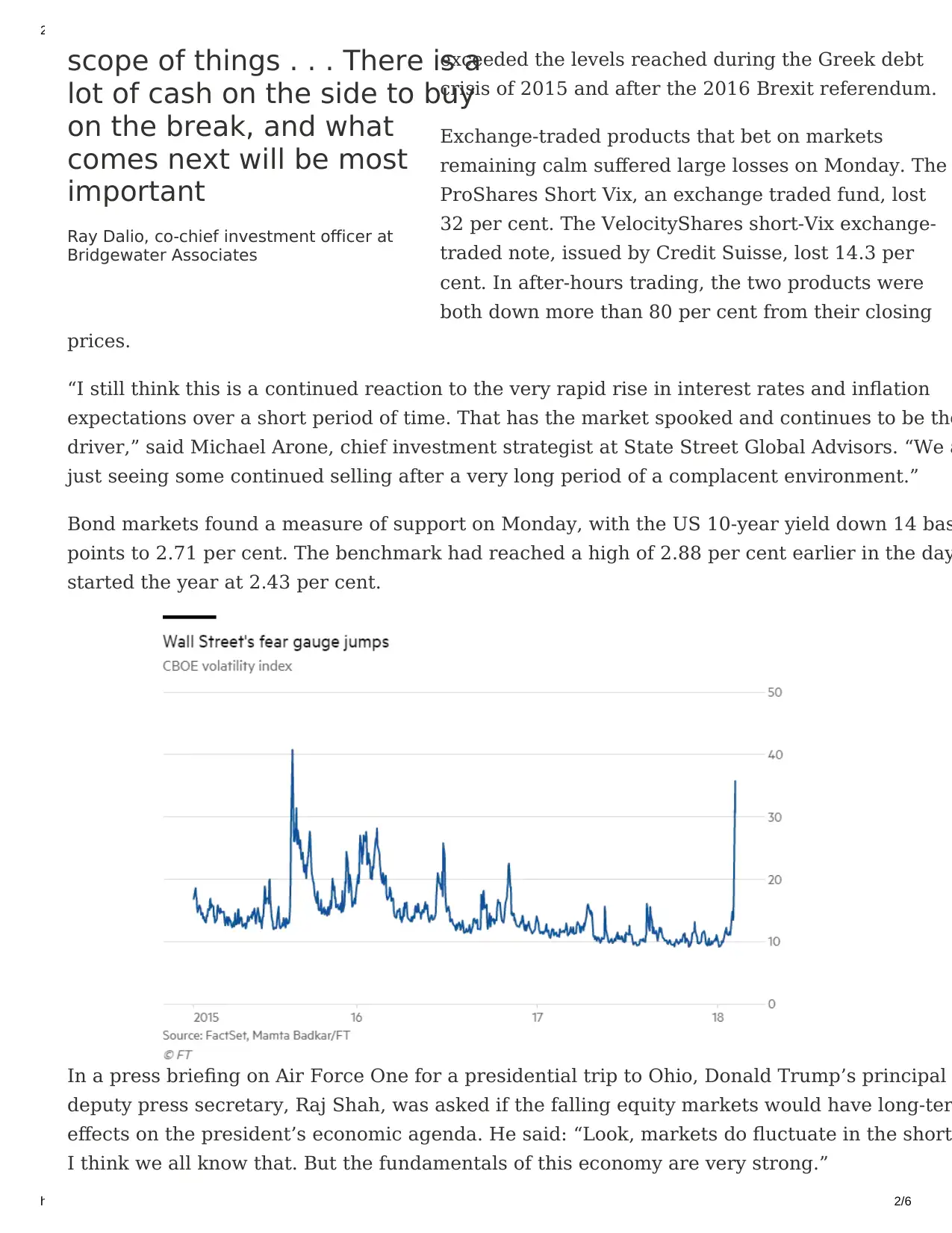
2/16/2018 US stocks suffer worst fall in 6 years
https://www.ft.com/content/af1f8e4a-0a23-11e8-8eb7-42f857ea9f09 2/6
exceeded the levels reached during the Greek debt
crisis of 2015 and after the 2016 Brexit referendum.
Exchange-traded products that bet on markets
remaining calm suffered large losses on Monday. The
ProShares Short Vix, an exchange traded fund, lost
32 per cent. The VelocityShares short-Vix exchange-
traded note, issued by Credit Suisse, lost 14.3 per
cent. In after-hours trading, the two products were
both down more than 80 per cent from their closing
prices.
“I still think this is a continued reaction to the very rapid rise in interest rates and inflation
expectations over a short period of time. That has the market spooked and continues to be the
driver,” said Michael Arone, chief investment strategist at State Street Global Advisors. “We a
just seeing some continued selling after a very long period of a complacent environment.”
Bond markets found a measure of support on Monday, with the US 10-year yield down 14 bas
points to 2.71 per cent. The benchmark had reached a high of 2.88 per cent earlier in the day
started the year at 2.43 per cent.
In a press briefing on Air Force One for a presidential trip to Ohio, Donald Trump’s principal
deputy press secretary, Raj Shah, was asked if the falling equity markets would have long-ter
effects on the president’s economic agenda. He said: “Look, markets do fluctuate in the short
I think we all know that. But the fundamentals of this economy are very strong.”
scope of things . . . There is a
lot of cash on the side to buy
on the break, and what
comes next will be most
important
Ray Dalio, co-chief investment officer at
Bridgewater Associates
https://www.ft.com/content/af1f8e4a-0a23-11e8-8eb7-42f857ea9f09 2/6
exceeded the levels reached during the Greek debt
crisis of 2015 and after the 2016 Brexit referendum.
Exchange-traded products that bet on markets
remaining calm suffered large losses on Monday. The
ProShares Short Vix, an exchange traded fund, lost
32 per cent. The VelocityShares short-Vix exchange-
traded note, issued by Credit Suisse, lost 14.3 per
cent. In after-hours trading, the two products were
both down more than 80 per cent from their closing
prices.
“I still think this is a continued reaction to the very rapid rise in interest rates and inflation
expectations over a short period of time. That has the market spooked and continues to be the
driver,” said Michael Arone, chief investment strategist at State Street Global Advisors. “We a
just seeing some continued selling after a very long period of a complacent environment.”
Bond markets found a measure of support on Monday, with the US 10-year yield down 14 bas
points to 2.71 per cent. The benchmark had reached a high of 2.88 per cent earlier in the day
started the year at 2.43 per cent.
In a press briefing on Air Force One for a presidential trip to Ohio, Donald Trump’s principal
deputy press secretary, Raj Shah, was asked if the falling equity markets would have long-ter
effects on the president’s economic agenda. He said: “Look, markets do fluctuate in the short
I think we all know that. But the fundamentals of this economy are very strong.”
scope of things . . . There is a
lot of cash on the side to buy
on the break, and what
comes next will be most
important
Ray Dalio, co-chief investment officer at
Bridgewater Associates
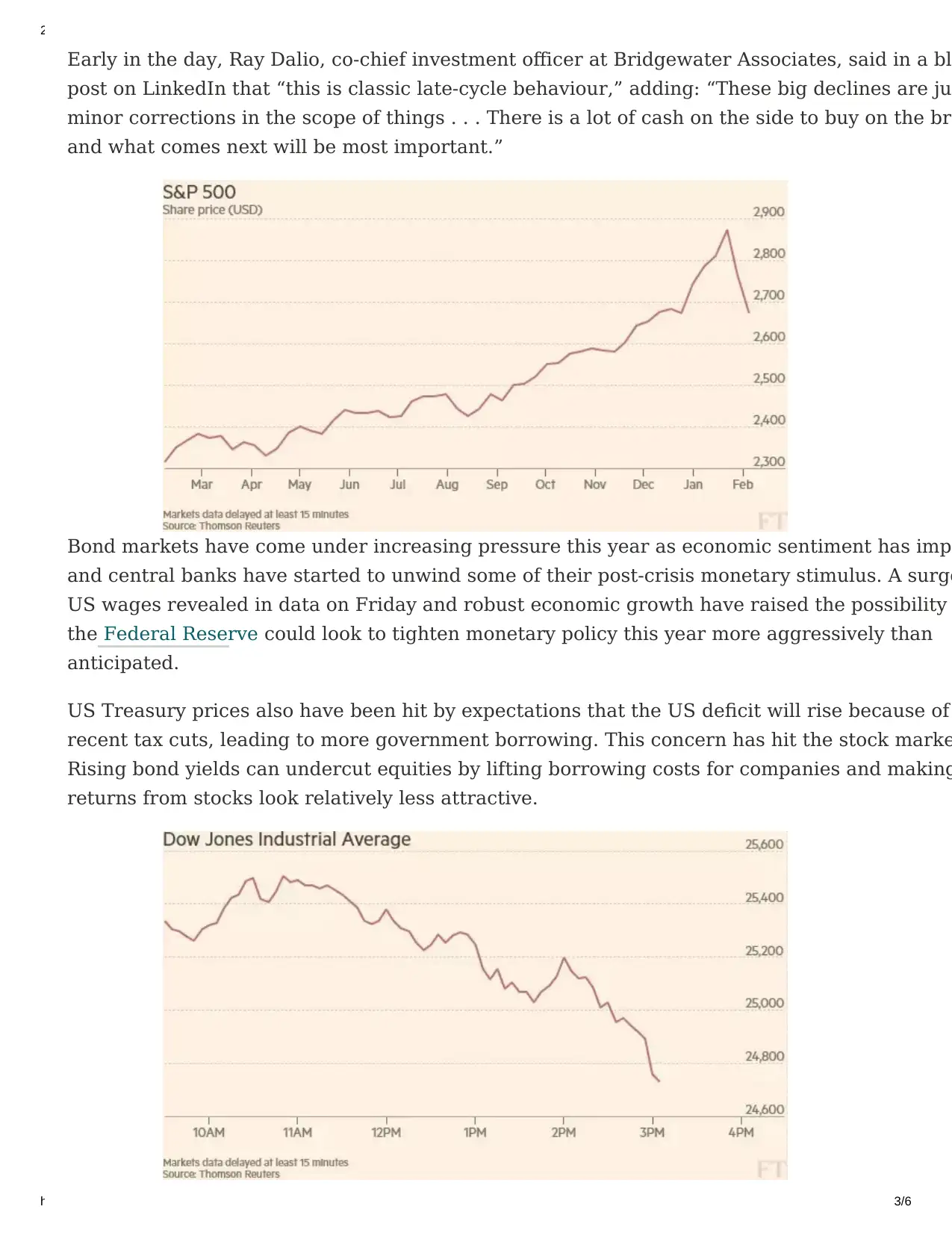
2/16/2018 US stocks suffer worst fall in 6 years
https://www.ft.com/content/af1f8e4a-0a23-11e8-8eb7-42f857ea9f09 3/6
Early in the day, Ray Dalio, co-chief investment officer at Bridgewater Associates, said in a blo
post on LinkedIn that “this is classic late-cycle behaviour,” adding: “These big declines are jus
minor corrections in the scope of things . . . There is a lot of cash on the side to buy on the bre
and what comes next will be most important.”
Bond markets have come under increasing pressure this year as economic sentiment has impr
and central banks have started to unwind some of their post-crisis monetary stimulus. A surge
US wages revealed in data on Friday and robust economic growth have raised the possibility
the Federal Reserve could look to tighten monetary policy this year more aggressively than
anticipated.
US Treasury prices also have been hit by expectations that the US deficit will rise because of
recent tax cuts, leading to more government borrowing. This concern has hit the stock marke
Rising bond yields can undercut equities by lifting borrowing costs for companies and making
returns from stocks look relatively less attractive.
https://www.ft.com/content/af1f8e4a-0a23-11e8-8eb7-42f857ea9f09 3/6
Early in the day, Ray Dalio, co-chief investment officer at Bridgewater Associates, said in a blo
post on LinkedIn that “this is classic late-cycle behaviour,” adding: “These big declines are jus
minor corrections in the scope of things . . . There is a lot of cash on the side to buy on the bre
and what comes next will be most important.”
Bond markets have come under increasing pressure this year as economic sentiment has impr
and central banks have started to unwind some of their post-crisis monetary stimulus. A surge
US wages revealed in data on Friday and robust economic growth have raised the possibility
the Federal Reserve could look to tighten monetary policy this year more aggressively than
anticipated.
US Treasury prices also have been hit by expectations that the US deficit will rise because of
recent tax cuts, leading to more government borrowing. This concern has hit the stock marke
Rising bond yields can undercut equities by lifting borrowing costs for companies and making
returns from stocks look relatively less attractive.
⊘ This is a preview!⊘
Do you want full access?
Subscribe today to unlock all pages.

Trusted by 1+ million students worldwide
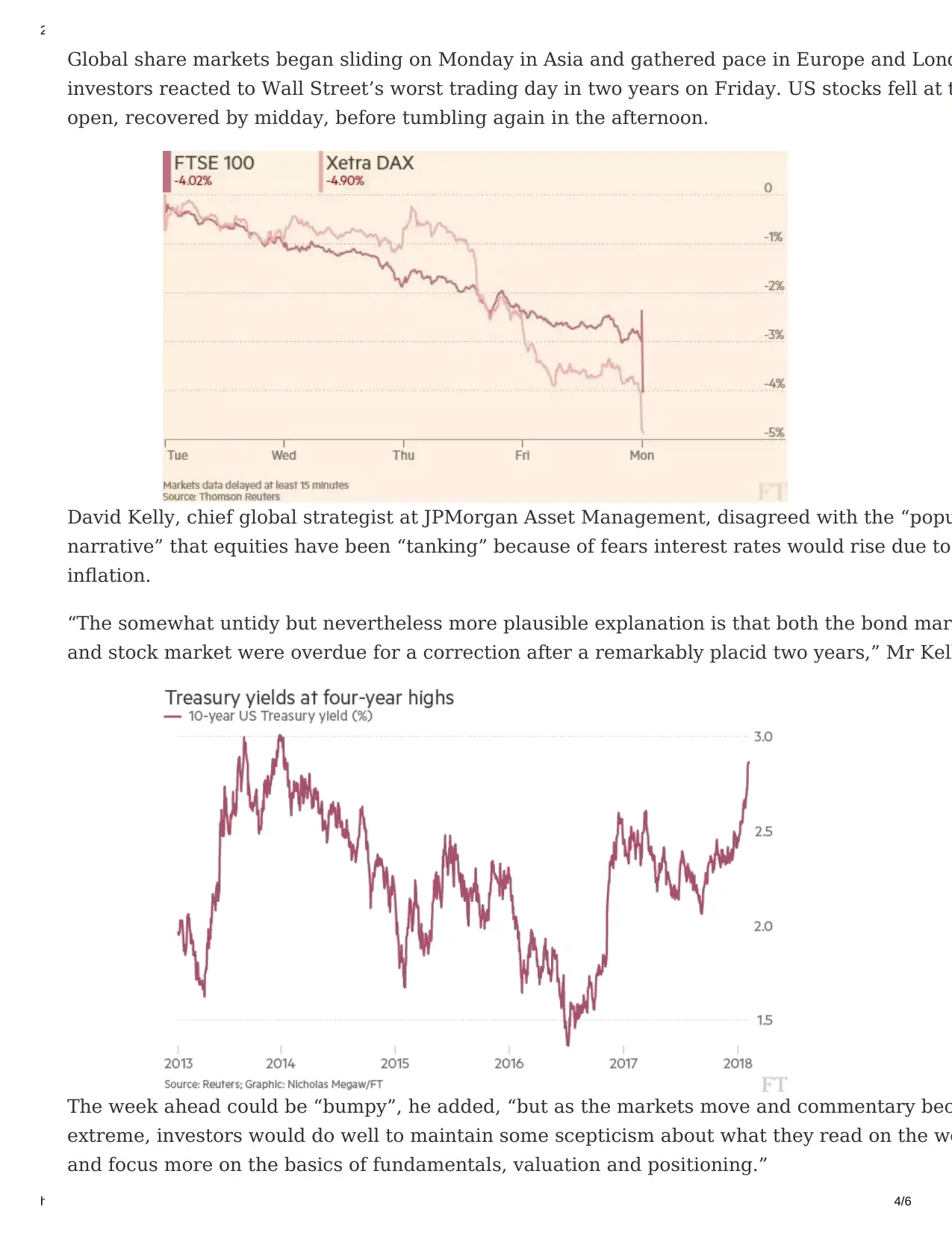
2/16/2018 US stocks suffer worst fall in 6 years
https://www.ft.com/content/af1f8e4a-0a23-11e8-8eb7-42f857ea9f09 4/6
Global share markets began sliding on Monday in Asia and gathered pace in Europe and Lond
investors reacted to Wall Street’s worst trading day in two years on Friday. US stocks fell at t
open, recovered by midday, before tumbling again in the afternoon.
David Kelly, chief global strategist at JPMorgan Asset Management, disagreed with the “popu
narrative” that equities have been “tanking” because of fears interest rates would rise due to
inflation.
“The somewhat untidy but nevertheless more plausible explanation is that both the bond mark
and stock market were overdue for a correction after a remarkably placid two years,” Mr Kell
The week ahead could be “bumpy”, he added, “but as the markets move and commentary bec
extreme, investors would do well to maintain some scepticism about what they read on the we
and focus more on the basics of fundamentals, valuation and positioning.”
https://www.ft.com/content/af1f8e4a-0a23-11e8-8eb7-42f857ea9f09 4/6
Global share markets began sliding on Monday in Asia and gathered pace in Europe and Lond
investors reacted to Wall Street’s worst trading day in two years on Friday. US stocks fell at t
open, recovered by midday, before tumbling again in the afternoon.
David Kelly, chief global strategist at JPMorgan Asset Management, disagreed with the “popu
narrative” that equities have been “tanking” because of fears interest rates would rise due to
inflation.
“The somewhat untidy but nevertheless more plausible explanation is that both the bond mark
and stock market were overdue for a correction after a remarkably placid two years,” Mr Kell
The week ahead could be “bumpy”, he added, “but as the markets move and commentary bec
extreme, investors would do well to maintain some scepticism about what they read on the we
and focus more on the basics of fundamentals, valuation and positioning.”
Paraphrase This Document
Need a fresh take? Get an instant paraphrase of this document with our AI Paraphraser
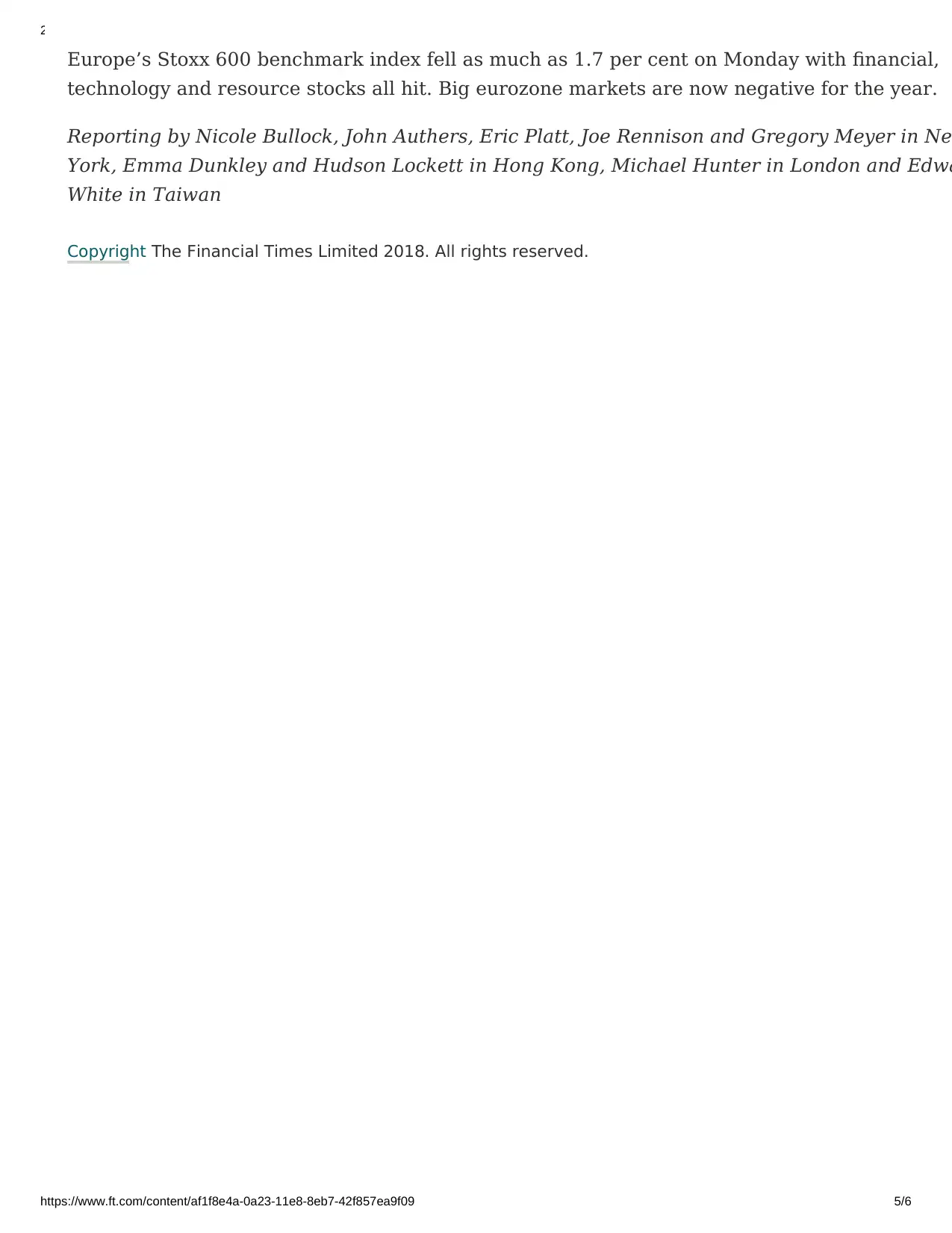
2/16/2018 US stocks suffer worst fall in 6 years
https://www.ft.com/content/af1f8e4a-0a23-11e8-8eb7-42f857ea9f09 5/6
Copyright The Financial Times Limited 2018. All rights reserved.
Europe’s Stoxx 600 benchmark index fell as much as 1.7 per cent on Monday with financial,
technology and resource stocks all hit. Big eurozone markets are now negative for the year.
Reporting by Nicole Bullock, John Authers, Eric Platt, Joe Rennison and Gregory Meyer in Ne
York, Emma Dunkley and Hudson Lockett in Hong Kong, Michael Hunter in London and Edwa
White in Taiwan
https://www.ft.com/content/af1f8e4a-0a23-11e8-8eb7-42f857ea9f09 5/6
Copyright The Financial Times Limited 2018. All rights reserved.
Europe’s Stoxx 600 benchmark index fell as much as 1.7 per cent on Monday with financial,
technology and resource stocks all hit. Big eurozone markets are now negative for the year.
Reporting by Nicole Bullock, John Authers, Eric Platt, Joe Rennison and Gregory Meyer in Ne
York, Emma Dunkley and Hudson Lockett in Hong Kong, Michael Hunter in London and Edwa
White in Taiwan
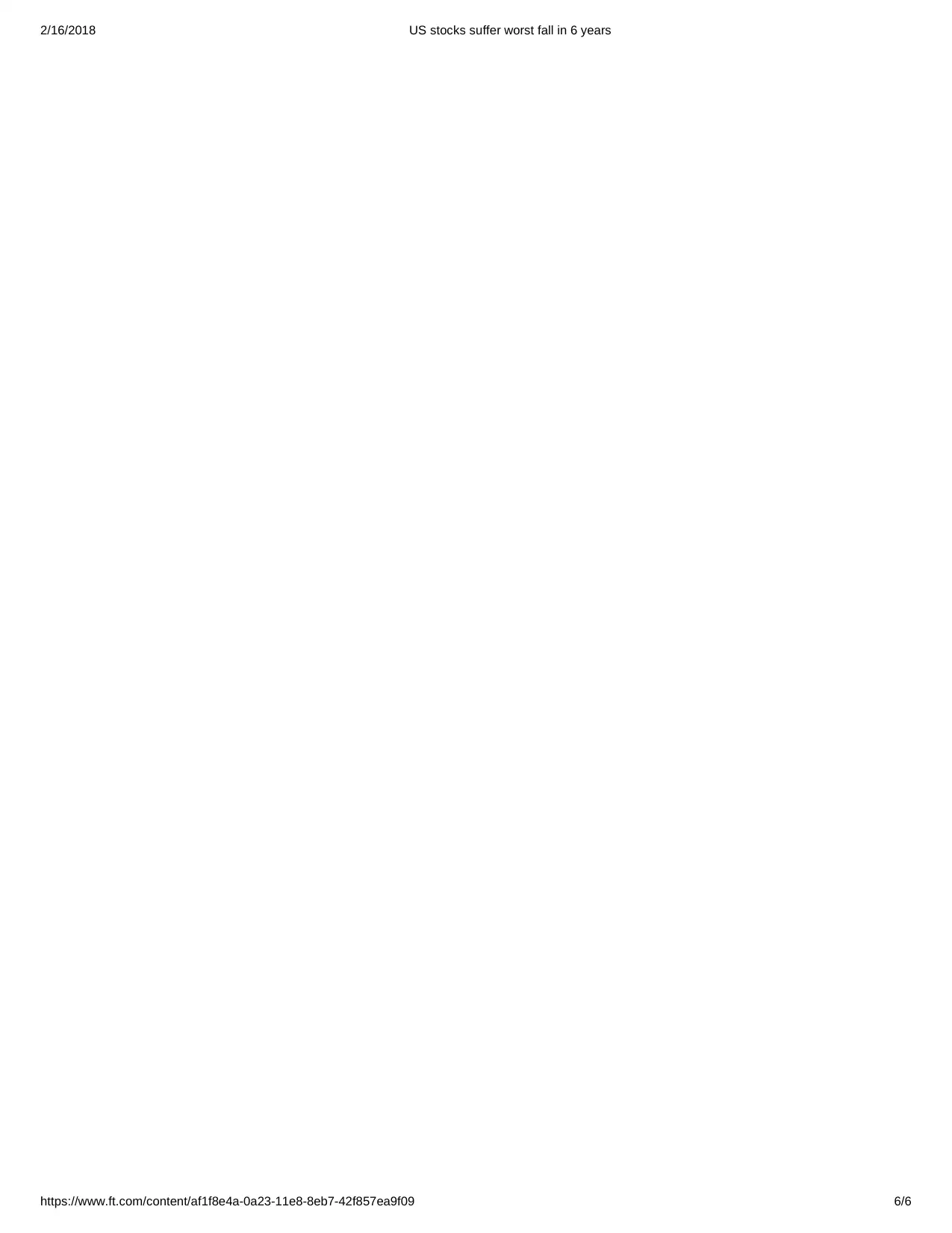
2/16/2018 US stocks suffer worst fall in 6 years
https://www.ft.com/content/af1f8e4a-0a23-11e8-8eb7-42f857ea9f09 6/6
https://www.ft.com/content/af1f8e4a-0a23-11e8-8eb7-42f857ea9f09 6/6
⊘ This is a preview!⊘
Do you want full access?
Subscribe today to unlock all pages.

Trusted by 1+ million students worldwide
1 out of 6
Your All-in-One AI-Powered Toolkit for Academic Success.
+13062052269
info@desklib.com
Available 24*7 on WhatsApp / Email
![[object Object]](/_next/static/media/star-bottom.7253800d.svg)
Unlock your academic potential
Copyright © 2020–2026 A2Z Services. All Rights Reserved. Developed and managed by ZUCOL.